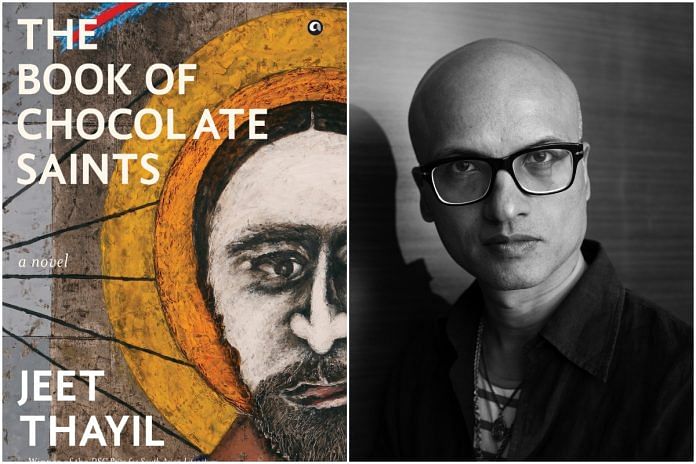Jeet Thayil’s latest is deeply provoking book about art, philosophy, and ‘chocolate saints’ who live in the margins of history.
Jeet Thayil’s ‘The Book Of Chocolate Saints’ blurs the boundaries between history and fiction. The outcome is an extremely engaging narrative which highlights the complex relationship between representation and referentiality.
The narrative revolves around the fictional character Newton Francis Xavier, a composite of the poet Dom Moraes and the painter F.N. Souza, founder of the Progressive Artists’ Group. The novel traces the life story of the poet and painter Xavier, right from his childhood to his final years, but it is much more than a ‘coming of age’ story.
Marked by a plurality of voices and perspectives, the novel is truly a polyphonic one, which does not offer a consistent monologue. Instead, we encounter contradictory worldviews and conflicting ideologies that do not allow a passive consumption of the text.
An alert reader can read beyond the text and develop his/her own interpretative strategies to make sense of the contradictions in the course of the narrative. The book does not demand willing suspension of disbelief but deep engagement, as it constantly draws attention through its various metafictional techniques. It is certainly not for those who are looking for an easy read.
It questions the Eurocentric history, premised on the marginalisation of all non-western civilisations. Quite early in the text, the young Xavier, who is still in school, says, “There is no sense of history in Goa that goes back further than five hundred years. For Goans, the idea of time begins with the Portuguese and the advent of Christianity: there is no notion of a pre-Christian civilisation though there must be one, would you not say?”
In keeping with the theme of interrogating Eurocentricism, the book successfully challenges the dominant representation of saints as white men by alerting the readers to the existence of those ‘chocolate saints’ who have been relegated to the footnotes of history so far. Jesus Christ in Xavier’s paintings is not ‘blonde and blue-eyed’ but a dark-skinned man.
Dedicated to the poet Moraes, the novel also attempts to paint the landscape of modernist Indian poetry in English, which unfortunately has not received much attention beyond certain university curriculums in India so far. However, it is not only about certain canonical poets, but also about those countless others whose voices could never be heard.
While depicting the struggles of various artists, both known and unknown, Thayil raises a very important question: What is necessary for the creation of art? Is it the “unstinting aimless motion” of a ‘never at home’ state of being? Is it a saintly self-denial? Or is it the heartlessness that the central protagonist Xavier exhibits towards those he loves? The novel offers no clear-cut answers. It does not attempt to demystify the creative process at all. In fact, it delineates its mysterious nature.
‘The Book of Chocolate Saints’ is an insightful exploration of the consequences of living in a Godless world, where it is no longer possible to cling on to some kind of reassuring order. As Xavier says, “The death of God is unbearable when he is all you have got. What can fill that hole? No amount of fame or love.”
The fictional universe in Thayil’s book not only underlines the epistemological uncertainty of our times but also shows that any quest for meaning and certainty in this universe can only be futile. Despite its bleak tone, the novel is also about love, desire and hope, which impel its characters to keep moving on, even in the face of despair and disillusionment.
Nandini Kalita is a doctoral fellow and teaching assistant in the Department of Humanities and Social Sciences at IIT, Delhi.



